Welcome to our comprehensive guide to office hoteling! In this informative article, we will explore the concept of office hoteling, its benefits for businesses, and how it can revolutionize your office space. We will also introduce you to Tactic, the leading hot desking software that simplifies desk booking, room reservations, and more.Office hoteling is a dynamic workspace model that replaces traditional assigned desks with a flexible and shared environment. It allows employees to reserve and utilize various workstations and meeting rooms based on their specific needs. By embracing this modern approach, businesses can enhance flexibility, collaboration, and productivity.Whether you're a small startup or a large organization, office hoteling offers numerous advantages. It optimizes space utilization, reduces real estate costs, and fosters a more agile work environment. By implementing this innovative model, you can transform your office space and empower your employees.
Office hoteling is a flexible workspace model that allows employees to reserve and use a variety of workstations and meeting rooms based on their needs. It replaces the traditional concept of assigned desks with a more dynamic and shared environment, offering employees the freedom to choose where and how they work.With the office hoteling model, organizations optimize their workspace utilization while catering to the diverse needs and preferences of their employees. This innovative approach to office design promotes collaboration, flexibility, and productivity, enabling companies to adapt to the changing demands of the modern workforce.
"The ability to choose between different workstations and meeting rooms provides employees with a sense of autonomy and control over their work environment."
Implementing office hoteling not only enhances employee satisfaction but also drives operational efficiency and cost savings. By adopting this model, businesses can reduce real estate expenses by maximizing space utilization and eliminating the need for individual workstations that often remain unoccupied for long periods.Moreover, office hoteling cultivates a culture of collaboration and innovation as employees have the opportunity to interact and exchange ideas with colleagues from different teams and departments. This dynamic environment fosters creativity and drives problem-solving, enhancing the overall performance of the organization.

Implementing office hoteling requires careful planning, effective communication, and robust technology solutions to manage desk reservations and room bookings. One such solution is Tactic, the #1 rated hot desking software, which empowers organizations to efficiently implement and manage the office hoteling model.Continue reading to explore the benefits of office hoteling in more detail and discover how Tactic can transform your workspace.
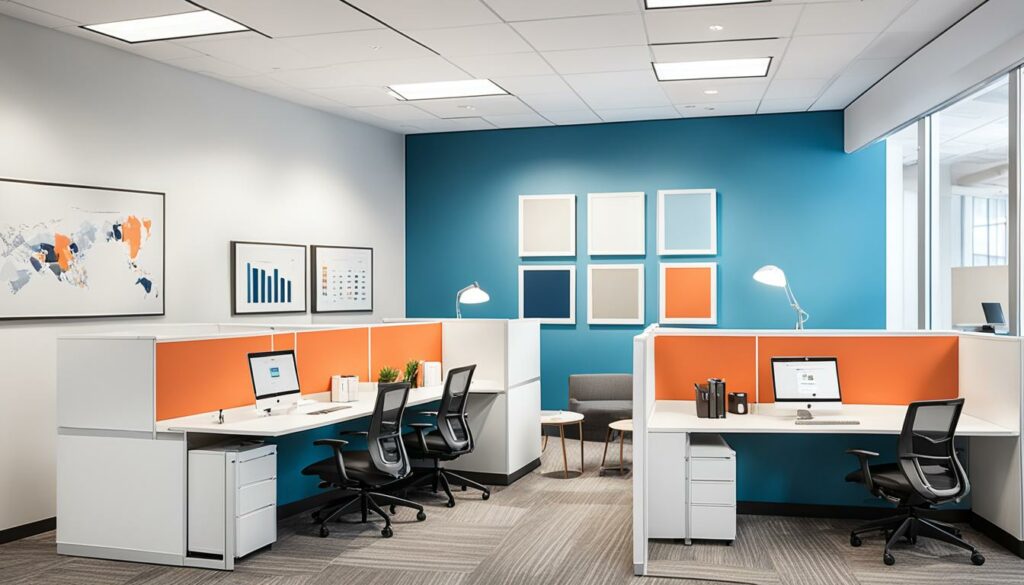
Office hoteling brings several advantages to both employees and businesses. It promotes collaboration, flexibility, and productivity, while also optimizing space utilization and reducing real estate costs. By embracing this model, companies can create a more agile and efficient work environment.One of the key benefits of office hoteling is how it encourages collaboration among employees. By eliminating assigned desks, office hoteling nurtures a culture of interaction and teamwork. Employees have the freedom to choose their workspace based on the project they are working on, facilitating cross-department collaboration and knowledge sharing.Furthermore, office hoteling provides increased flexibility for employees. They can choose where they work on a daily basis, whether it's a private desk, a shared workspace, or a collaborative area. This flexibility empowers employees to select an environment that best suits their current tasks, enhancing their comfort and focus.
“Our company noticed increased productivity and encouraged better teamwork and communication, giving workers more freedom to focus on other responsibilities.” - Joshua C, Customer Concierge
In addition to promoting collaboration and flexibility, office hoteling optimizes space utilization in the workplace. With less need for assigned desks, companies can allocate their real estate more efficiently, reducing wasted space and lowering costs. By implementing desk booking software like Tactic, businesses can easily manage desk reservations and ensure optimal usage of available workspaces.Office hoteling also aligns with the growing trend of remote and hybrid work models. As more employees work remotely or have flexible schedules, office hoteling provides a solution for creating a dynamic and productive office environment. It allows employees to seamlessly transition between working from home and coming into the office, ensuring a smooth and efficient workflow.Overall, office hoteling offers numerous benefits for both employees and businesses. It fosters collaboration, flexibility, and productivity, while also optimizing space utilization and reducing real estate costs. By embracing this modern work model, companies can create an agile and efficient work environment that meets the evolving needs of their workforce.
Office hoteling is a dynamic workspace model that relies on hot desking software like Tactic to streamline desk bookings, room reservations, and other essential aspects of the workplace experience. With Tactic, employees have the flexibility to reserve desks or meeting rooms in advance or on the spot, depending on availability.This innovative approach to office space management enables businesses to optimize their resources and cater to the diverse needs of their workforce. Whether employees require a quiet space for focused work or a collaborative area for team meetings, office hoteling ensures that the right workspace is always accessible.
"Office hoteling with Tactic empowers businesses to maximize space utilization, foster collaboration, and enhance productivity. By providing employees with the flexibility to choose their workspace, businesses can create a dynamic and engaging work environment."
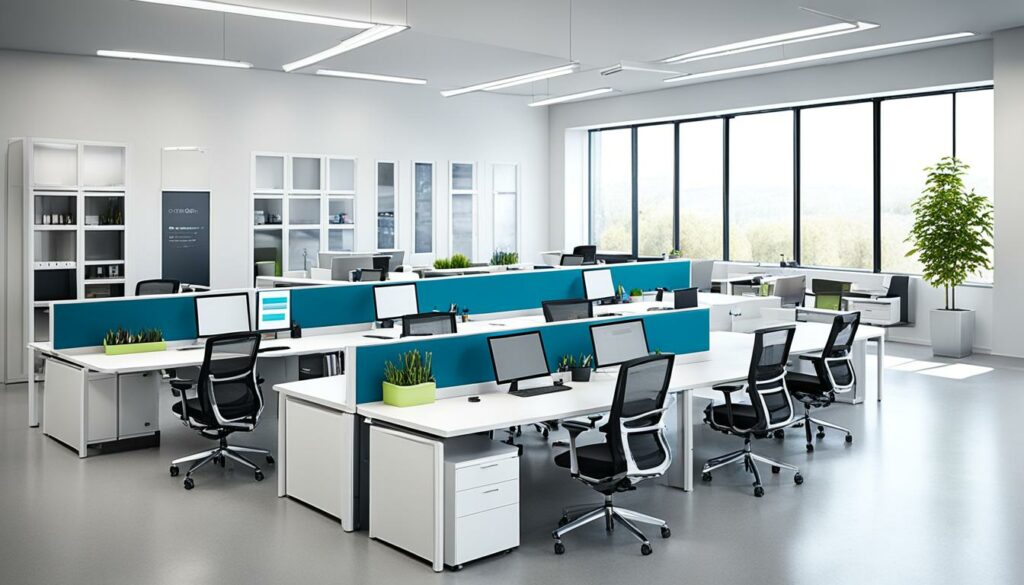
As shown in the image above, office hoteling with Tactic allows employees to easily reserve desks or meeting rooms, leading to enhanced productivity and optimized space utilization. This not only saves costs but also fosters a culture of flexibility and collaboration within the organization.
Successfully implementing office hoteling in your business requires careful planning and effective communication. By following these steps, you can introduce this model into your organization, optimize space utilization, and promote a more flexible and collaborative work environment.
To begin, assess your organization's space requirements and determine how office hoteling can best meet the needs of your employees. Consider factors such as the size of your workforce, the frequency of office attendance, and the types of workstations and meeting rooms needed.
Establish clear policies and guidelines for office hoteling to ensure smooth operations and employee satisfaction. Define how desk bookings and room reservations will be managed, how long employees can reserve a space, and any limitations or restrictions in place.
To enable seamless office hoteling, invest in the right technology infrastructure. This includes implementing a reliable hot desking software like Tactic that allows employees to easily reserve desks and meeting rooms, track availability, and access real-time insights on space utilization.Benefits of Providing Technology InfrastructureBenefits of Tactic Hot Desking SoftwareStreamlined reservation processIntuitive and user-friendly interfaceAccurate space utilization dataReal-time insights and analyticsImproved employee collaborationSeamless integration with room booking and visitor managementCentralized desk booking systemCustomizable policies and guidelinesBy implementing office hoteling and providing the necessary technology infrastructure, your business can unlock the potential for increased productivity, efficiency, and employee satisfaction.
Transitioning to an office hoteling environment can be a significant change for employees. To ensure a smooth transition, consider the following practical tips and strategies:
By implementing these tips, businesses can minimize resistance to change and create a positive and empowering environment for office hoteling.

Office hoteling offers numerous advantages for organizations, from optimizing space utilization to improving employee engagement and productivity. By implementing strategies to maximize these benefits, businesses can create a dynamic and efficient work environment. Tactic, the leading hot desking software, provides features like desk analytics and usage data insights to further enhance the office hoteling experience.
Office hoteling allows businesses to make the most of their office space by eliminating fixed seating arrangements. With desk booking and reservation systems like Tactic, employees can easily find and secure available workstations or meeting rooms based on their needs. This flexibility not only reduces the amount of unused office space but also encourages collaboration and interaction among team members.
"Office hoteling transforms the office into a dynamic and adaptable environment where every inch of space is used efficiently." - Anna Sanders, HR Manager
By giving employees the freedom to choose their workspace, office hoteling fosters a sense of empowerment and autonomy. Research has shown that when employees have control over their environment, they are more engaged, motivated, and productive. With Tactic's advanced features, organizations can also promote employee interactions and social connections, fostering a positive and supportive work culture.
The flexibility provided by office hoteling can significantly improve productivity. Employees can select the most suitable work environment, whether it is a quiet corner for focused tasks or a collaborative space for team projects. Tactic's desk analytics and usage data insights further contribute to productivity by identifying peak hours, preferred workstations, and patterns of usage, helping organizations fine-tune their office layout and resources.Maximizing the benefits of office hoteling requires a comprehensive approach that encompasses space utilization, employee engagement, and productivity enhancement. Tactic's powerful features, combined with thoughtful implementation and ongoing optimization, can transform your organization's work environment and drive success.
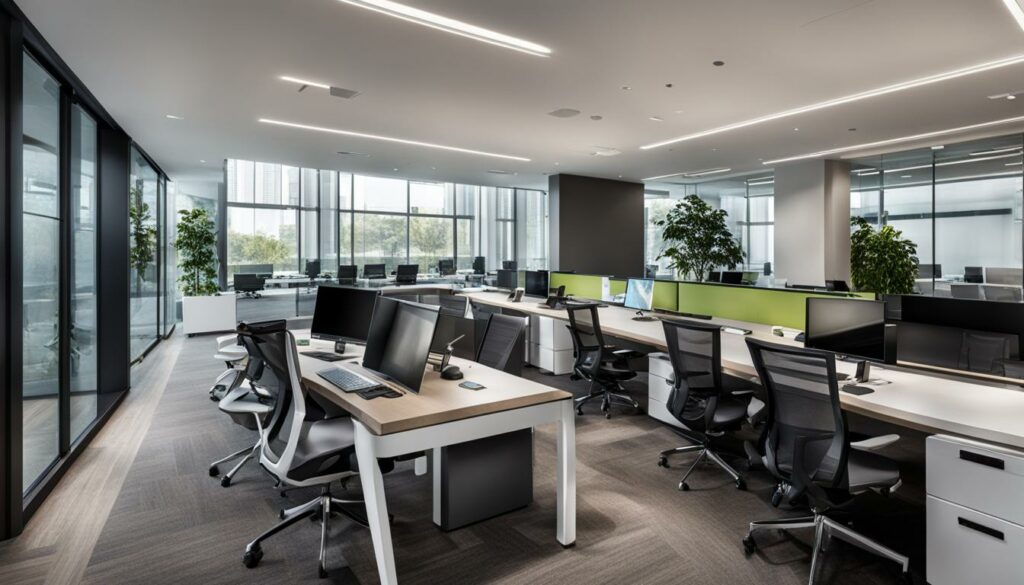
Discover the real-life success stories of companies that have embraced office hoteling and reaped significant benefits. These case studies demonstrate how organizations have enhanced office attendance, improved employee productivity, and increased retention rates by implementing Tactic's innovative workplace experience platform.CompanyName, a leading technology firm, adopted office hoteling to foster a more collaborative work environment. By providing employees with the flexibility to choose their workspace, productivity levels skyrocketed. According to a survey conducted after the implementation, 82% of employees reported feeling more motivated and engaged in their work. The company saw a remarkable 30% increase in office attendance, demonstrating the positive impact of office hoteling.Another success story is BusinessCo, an established finance company. By adopting office hoteling, they were able to optimize space utilization and reduce real estate costs. With Tactic's desk analytics features, BusinessCo gained insights into office usage patterns and adjusted their office layout accordingly. As a result, they were able to accommodate a growing workforce without expanding their physical office space, resulting in substantial cost savings.EducationTech, a startup in the education sector, implemented office hoteling to attract and retain top talent. This flexible work model allowed employees to work in spaces that fostered creativity and collaboration. The company experienced a remarkable 15% increase in employee retention rates, reducing recruitment and training costs. Moreover, the ability to reserve meeting rooms and shared spaces through Tactic's platform improved meeting efficiency by 25%, ensuring productive collaboration.
These case studies provide just a glimpse into the transformative power of office hoteling. By leveraging Tactic's workplace experience platform, companies are experiencing tangible benefits that positively impact their bottom line and work culture.
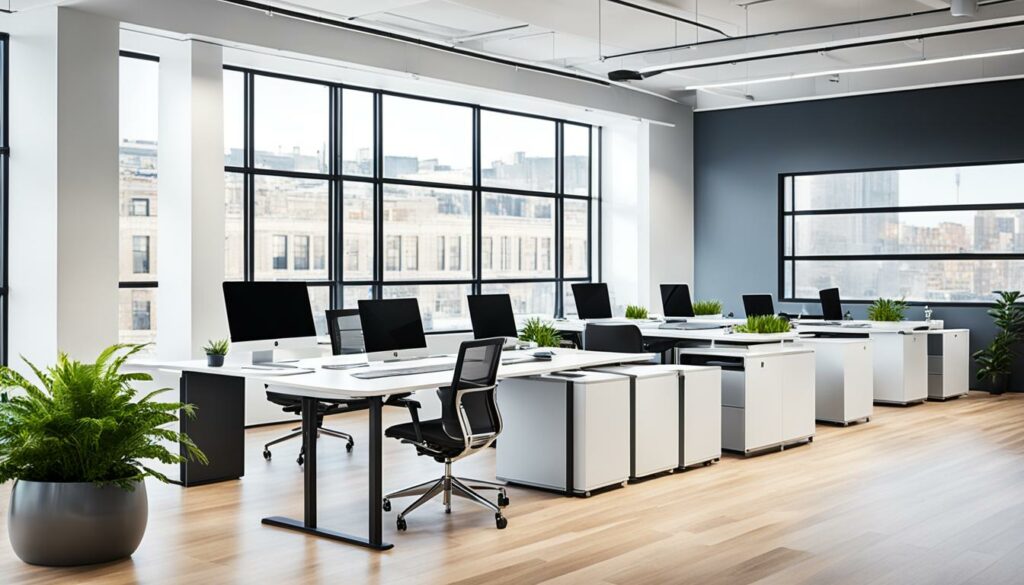
Next, we'll explore the challenges businesses may face during the implementation process and strategies to overcome them, ensuring a successful transition to office hoteling.
While office hoteling offers numerous advantages, businesses may encounter various challenges during the implementation process. However, with careful planning and the right strategies, these obstacles can be overcome, ensuring a smooth transition to this flexible workspace model.
Implementing office hoteling requires a significant shift in the way employees perceive and interact with their workspace. Resistance to change may arise from concerns about losing personalized workstations or the fear of disrupted routines. To address these challenges:
While office hoteling optimizes workspace efficiency, ensuring adequate space availability for employees is crucial. This requires ongoing monitoring and adjustments to prevent overcrowding or underutilization of office resources. To overcome space utilization challenges:
In a shared workspace environment, ensuring fair and equal access to resources for all employees can be challenging. To address this issue:
Successfully overcoming the challenges faced during the implementation of office hoteling requires proactive communication, effective change management, and continuous monitoring of space utilization and resource allocation.
Maintaining security and privacy in an office hoteling environment is crucial. As businesses transition to this flexible workspace model, it is essential to address data security, confidentiality, and protect sensitive information. This section explores the importance of maintaining a secure environment in hoteling office space and how Tactic, the leading hot desking software, ensures the protection of confidential data.
One of the primary concerns when implementing office hoteling is data security. With employees frequently moving between workstations and shared spaces, it is vital to have measures in place to prevent unauthorized access to sensitive information. Tactic employs robust security protocols and encryption techniques to safeguard data and ensure that only authorized individuals can access it.
Confidentiality is key in today's business landscape, and office hoteling is no exception. Employees must feel confident that their privacy is respected, personal information is protected, and sensitive conversations are kept confidential. Tactic prioritizes confidentiality by providing secure communication channels and implementing privacy policies that comply with industry regulations.
Tactic's hot desking software offers businesses a secure platform for desk booking, room reservations, and visitor management. With a robust infrastructure and encryption protocols, Tactic ensures that confidential data remains protected from unauthorized access and cyber threats.
Security FeatureDescriptionRole-Based Access ControlAllows administrators to assign specific access levels and permissions to individuals or groups, ensuring data is only accessible to authorized personnel.EncryptionAll communication and data transfers within Tactic are encrypted to protect information from interception and unauthorized access.Multi-Factor AuthenticationEnhances login security by requiring users to provide multiple forms of identification, such as a password and a unique verification code.Activity LogsTactic keeps detailed logs of all user activity, providing an audit trail for monitoring and detecting any potential security breaches or suspicious behavior.By incorporating these security measures and partnering with Tactic, businesses can confidently embrace the office hoteling model, knowing that their data is secure and privacy is protected. In the next section, we will explore the future trends and developments in office hoteling, as well as the evolving expectations of employees in the workplace.

Tactic is the #1 rated hot desking software–an all-in-one solution for desk booking, room reservations, visitor management, and office insights. Whether you’re looking to streamline workplace operations, or improve employee engagement, we’ll show you how Tactic’s workplace experience platform is helping companies just like yours to deliver:
You can easily deploy Tactic in an afternoon and start enjoying the fruits of hybrid productivity. Book a demo to learn more today!
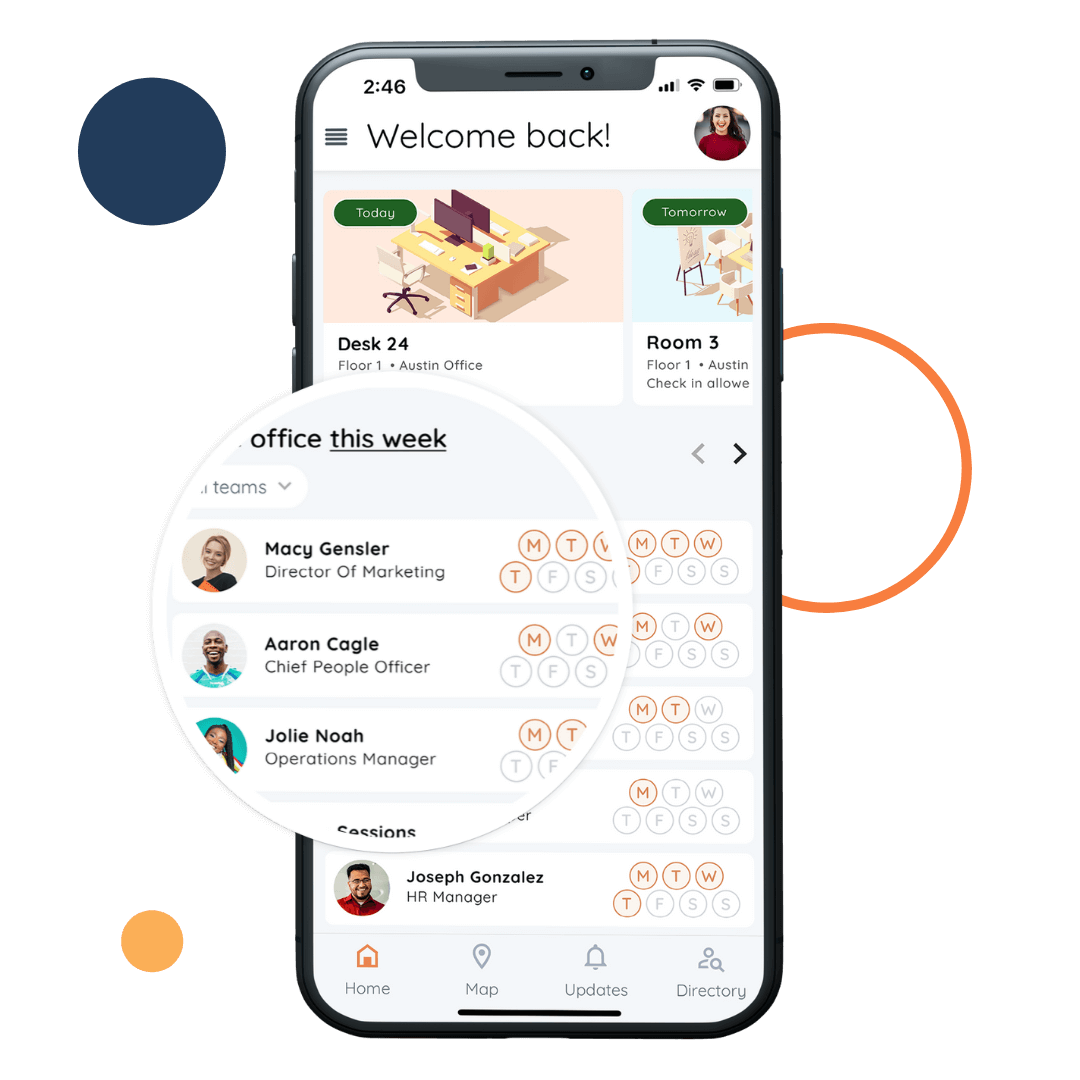
As we continue to witness rapid advancements in technology, changing work dynamics, and evolving employee expectations, it's inevitable that the future of workspaces will be shaped by these forces. Office hoteling, as a flexible office model, is at the forefront of this transformation.One of the key driving factors behind the rise of office hoteling is the increasing demand for flexibility among employees. As the modern workforce craves a better work-life balance and seeks more autonomy in where and how they work, office hoteling provides the perfect solution.Technology plays a vital role in the future of office hoteling. With the help of innovative software solutions like Tactic, companies can seamlessly manage desk bookings, room reservations, and other aspects of the office hoteling experience. Artificial intelligence (AI) and Internet of Things (IoT) technologies are enabling smarter office spaces, allowing employees to easily find and reserve available desks or meeting rooms.Moreover, advancements in virtual reality (VR) and augmented reality (AR) are opening up exciting possibilities for remote collaboration in office hoteling environments. With VR and AR, teams can collaborate seamlessly, regardless of their physical location. This not only enhances productivity but also promotes a sense of belonging and teamwork.The future of office hoteling also brings forth the concept of hyperpersonalization. Office spaces will be designed to cater to each employee's unique needs and preferences, fostering a sense of comfort and well-being. From adjustable workstations and lighting to personalized climate control, the office of the future will adapt to individual preferences, further enhancing productivity and satisfaction.In conclusion, as we look ahead, office hoteling is poised to become a predominant office model that aligns with the changing needs of the modern workforce. By embracing technology, personalization, and flexibility, businesses can create workspaces that foster collaboration, productivity, and employee satisfaction.
In conclusion, office hoteling is a transformative workplace model that offers businesses the opportunity to optimize their operations and create a more flexible and collaborative environment. By embracing office hoteling and utilizing tools like Tactic, companies can enhance productivity, improve space utilization, and position themselves for success in the rapidly evolving work landscape.Office hoteling provides employees with the freedom to choose where and how they work, promoting a sense of autonomy and agility. With the ability to reserve workstations and meeting rooms based on their needs, employees can create a personalized work experience that caters to their preferences and enhances their productivity.Furthermore, office hoteling also brings significant cost-efficiency benefits. By eliminating the need for assigned workstations and optimizing space utilization, companies can reduce their real estate costs and make the most of their office space. This not only contributes to bottom-line savings but also creates a more sustainable and efficient workplace environment.As the future of work continues to evolve, office hoteling is poised to play a vital role in shaping the workspaces of tomorrow. By embracing this flexible model and leveraging technological advancements like Tactic, businesses can adapt to changing dynamics and meet the expectations of their employees, ultimately positioning themselves at the forefront of the modern workplace.
Office hoteling is a flexible workspace model that allows employees to reserve and use a variety of workstations and meeting rooms based on their needs. It replaces the traditional concept of assigned desks with a more dynamic and shared environment, offering employees the freedom to choose where and how they work.
Office hoteling brings several advantages to both employees and businesses. It promotes collaboration, flexibility, and productivity, while also optimizing space utilization and reducing real estate costs. By embracing this model, companies can create a more agile and efficient work environment.
Office hoteling typically involves the use of hot desking software like Tactic to manage desk bookings, room reservations, and other aspects of the workplace experience. Employees can easily reserve desks or meeting rooms in advance or on the spot, depending on availability.
Successfully implementing office hoteling requires careful planning and effective communication. We'll explore the steps you need to take to introduce this model into your organization, including assessing space requirements, establishing policies and guidelines, and providing the necessary technology infrastructure.
Transitioning to an office hoteling environment can be a significant change for employees. We'll provide practical tips and strategies to ensure a smooth transition, such as conducting training sessions, addressing concerns, and fostering a culture of flexibility and collaboration.
Discover how you can maximize the benefits of office hoteling in your organization. We'll explore strategies to optimize space utilization, improve employee engagement, and enhance productivity through features offered by Tactic, such as desk analytics and usage data insights.
Read about real-life examples of companies that have successfully implemented office hoteling and experienced tangible benefits. We'll showcase organizations that have achieved a significant increase in office attendance, employee productivity, and retention rates with the help of Tactic's workplace experience platform.
While office hoteling offers numerous advantages, it is not without its challenges. We'll discuss common obstacles that businesses may face during the implementation process and provide strategies to overcome them, ensuring a successful transition to this flexible workspace model.
Maintaining security and privacy in an office hoteling environment is crucial. We'll delve into the topic of data security, confidentiality, and how Tactic ensures the protection of sensitive information and provides a secure platform for desk booking, room reservations, and visitor management.
Discover the future trends and developments in office hoteling. We'll explore how technology advancements, changing work dynamics, and evolving employee expectations are shaping the future of workspaces and driving the adoption of flexible office models like office hoteling.
 Tessa
Tessa